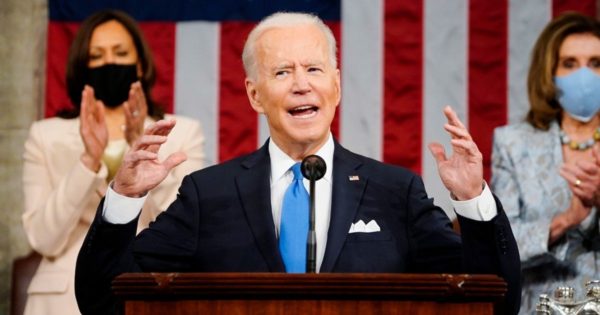
President Biden on Wednesday made the case for sweeping government action in an address to a sparsely populated joint session of Congress like no other in U.S. history.
Speaking on the 99th day of his presidency in a chamber overrun by insurrectionists just more than three months ago, Biden laid out an ambitious legislative agenda before an audience of lawmakers severely limited by the coronavirus pandemic.
Biden used his address to tout his efforts to get the nation back to normal after the pandemic and the divisive presidency of Donald Trump. He made no direct mention of his predecessor, but argued those present had a responsibility to “prove democracy still works and our government still works and we can deliver for our people.”
“We have stared into an abyss of insurrection and autocracy — of pandemic and pain — and ‘We the People’ did not flinch,” Biden said. “At the very moment our adversaries were certain we would pull apart and fail. We came together.”
In a historic first, two women were seated directly behind Biden on the dais: Speaker Nancy Pelosi (D-Calif.) and Vice President Harris.
The president fist-bumped masked lawmakers as he entered the chamber, including Rep. Liz Cheney (Wyo.), the third-ranking House Republican, who voted to impeach former President Trump for inciting the Jan. 6 mob.
He outlined what he said were the successes of a nationwide vaccination effort and a $1.9 trillion economic relief package signed into law in March.
And he touted new legislative proposals to invest a total of $4 trillion to build climate-friendly infrastructure such as roadways and broadband as well as child care and family leave programs.
Biden said it was time to acknowledge that the trickle-down economics of the Reagan era had failed, proposing major tax hikes on corporations, investment income and wealthy households.
“We have to do more than just build back. We have to build back better,” Biden said. “We have to compete more strenuously than we have.”
“Throughout our history, public investments and infrastructure have literally transformed America. These are investments we made together, as one country, and investments that only the government was in a position to make. Time again, they propel us into the future,” he added.
The proposals face a deeply uncertain fate in Congress, where Democrats hold only a slim majority. Earlier Wednesday, Sen. Joe Manchin (W.Va.), a centrist Democrat, expressed discomfort with the price tag of Biden’s agenda.
The president, who campaigned as a moderate who could win over Republicans and ease partisan tensions, extended an olive branch multiple times in his remarks by welcoming GOP proposals and negotiation on his ideas. But he made clear inaction was unacceptable, framing it as a matter of restoring confidence in government.
He also described his proposals as those that have historically had bipartisan support, reflecting the White House’s efforts to redefine the notion of bipartisanship.
“We welcome ideas. But the rest of the world isn’t waiting for us. Doing nothing is not an option,” Biden said. “We can’t be so busy competing with each other that we forget the competition is with the rest of the world to win the 21st century.”
There were a few moments of bipartisan applause during the speech, such as when Biden vowed to confront China and promoted his “Buy American” initiative. The president chatted with lawmakers on his way out of the chamber, including Sen. Rob Portman (R-Ohio), who is among the Republican senators who offered a counterproposal to Biden’s infrastructure plan.
In contrast, Sen. Ted Cruz (R-Texas) was seen on camera appearing to doze off during the address.
Biden sought to frame the gridlock that has come to define Washington, D.C., as a looming threat to the country’s democracy. He boasted that the early actions of his administration have shown how the government can work for the public but cautioned that lingering apathy from lawmakers would have lasting consequences.
“In another era when our democracy was tested, Franklin Roosevelt reminded us — in America, we do our part. That’s all I’m asking, that we all do our part,” Biden said.
He urged Congress to pass immigration reform, even if by piecemeal, to protect Dreamers and secure the border, and renewed a push for a ban on assault weapons and expanded background checks. He called on lawmakers from both parties to “find consensus” and pass policing reform by the anniversary of George Floyd’s death next month. And he urged the Senate to pass the Equality Act, which would expand protections for members of the LGBTQ community.
Biden called on Congress to pass a $15 minimum wage, a progressive priority that has run into opposition among even some Democrats in the Senate. And he pushed for action on lowering drug prices and expanding Medicare benefits, two elements for which Democrats advocated that were left out of his families plan when it was unveiled by the White House in advance of the speech.
The laundry list of priorities won applause from moderate and progressive Democrats alike. But with slim Democratic majorities in the House and Senate, each of those legislative efforts face an uphill battle and will require the support of at least some Republican senators.
“I was not overly inspired,” said Sen. Lisa Murkowski (R-Alaska), a moderate Republican who has backed some Biden nominees. “I think he wanted to make sure we knew all of the ins and outs of his various plans. I was looking for more of an uplifting and outreach on the bipartisan note that we heard from the inauguration speech.”
Another one of those senators, Tim Scott (R-S.C.), delivered the GOP rebuttal to Biden’s speech. He panned Biden’s agenda and argued that the government spending and tax hikes would weaken the economy, accusing Democrats of divisive action by passing a “partisan” coronavirus relief bill.
“The actions of the president and his party are pulling us further and further apart,” Scott said.
Via The Hill
